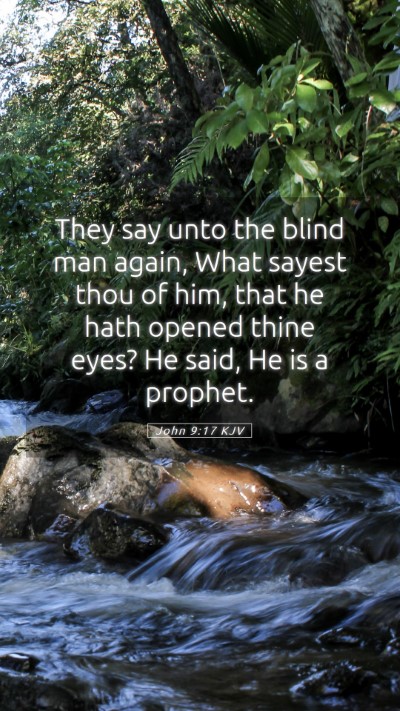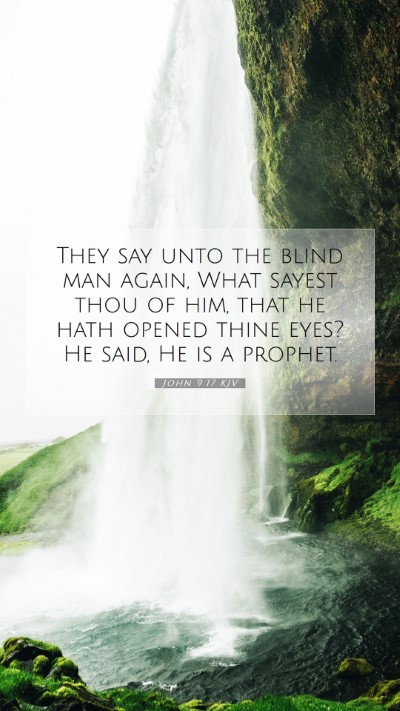Understanding John 9:17: A Comprehensive Bible Verse Commentary
In this exposition, we explore John 9:17, where the response to the healed blind man’s testimony deepens our comprehension of Jesus’ identity and the implications of His works. This commentary synthesis draws insights from esteemed public domain theologians, including Matthew Henry, Albert Barnes, and Adam Clarke, offering a multi-faceted understanding of this scripture.
Verse Context and Meaning
John 9:17 states: “So they said again to the blind man, 'What do you say about him, since he has opened your eyes?' He said, 'He is a prophet.'” This encounter follows the miraculous healing of a man born blind, showcasing several important themes in biblical interpretation and exegesis.
Exploring the Responses
The Pharisees’ inquiry into the identity of Jesus reflects their rigid adherence to the Law and disbelief in miracles. The healed man’s response, recognizing Jesus as a prophet, reveals his initial understanding of Jesus’ authority and divine mission.
Insights from Matthew Henry
According to Matthew Henry, the healed man’s acknowledgment of Jesus as a prophet signifies a growing revelation of Christ’s divine nature. Initially, his recognition is limited, suggesting that spiritual understanding often evolves with experience and revelation.
Insights from Albert Barnes
Albert Barnes emphasizes the significance of the title “prophet” as linked to an expectation in Jewish culture regarding messianic figures. The healed man’s progression from seeing Jesus merely as a miracle worker to recognizing Him as a central prophetic figure illustrates the importance of personal testimony in understanding scripture.
Insights from Adam Clarke
Adam Clarke adds that the blind man’s declaration is also a subtle challenge to the authority of the Pharisees. By claiming Jesus is a prophet, he asserts both the legitimacy of the miracle and Jesus’ alignment with God’s will, reversing the typical power dynamics.
Key Themes and Applications
- Jesus as a Prophet: The acknowledgment of Jesus’ prophetic role invites readers to ponder their understanding of His identity and mission.
- Growth in Understanding: The text illustrates the importance of experiential knowledge in spiritual matters, as the healed man’s perception expands throughout the narrative.
- Faith vs. Tradition: The healing story contrasts faith in Jesus with rigid social and religious traditions represented by the Pharisees.
Relevance in Bible Study
This verse serves as a valuable reference during bible study groups or online bible study sessions. It encourages believers to delve into bible study tools and bible study resources that explore the nature of Jesus and the accompanying miracles.
Understanding Difficult Passages
The complexities of the Pharisees’ skepticism provide a template for examining difficult scripture passages. Understanding the historical context of Bible verses enhances our grasp of their significance.
Encouragement for Personal Reflection
As believers, we are prompted to reflect on our own journeys of faith. The inquiry of “What do you say about Him?” challenges us to articulate our understanding and experiences of Jesus in our lives.
Cross References
- Matthew 21:11: The crowds acknowledge Jesus as a prophet.
- Luke 7:16: The people proclaim Jesus as a great prophet after raising a widow's son.
- Deuteronomy 18:15: The prophecy of a prophet like Moses foretells the coming of a Messiah.
Conclusion
In summary, John 9:17 presents an opportunity for deep bible study insights that enhance our understanding of Scripture. By exploring the meanings behind the text with the guidance of various biblical commentators, we gain a richer appreciation for the message of Christ and the impact of His miracles on faith formation.


